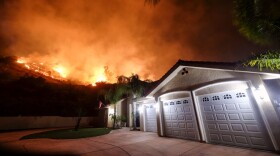Indigenous voters represent a fraction of the total voting population, but in the battleground states of Nevada and Arizona, their vote could be pivotal this year. But Native voters face many difficulties in casting their vote, from having to travel long distances to register or to a ballot box, to difficulty complying with voter ID laws.
University of Utah Professor Daniel McCool is the co-author of a study called “Obstacles at Every Turn.” McCool said there have been several lawsuits in Western states challenging practices common in Indigenous communities such as ballot collections. That's when a person other than a family member or officially designated person delivers ballots for other voters.
“In Nevada there was an effort by Republicans to outlaw ballot collection but it failed,” said McCool.
In Arizona, there was a law preventing absentee ballots from being delivered by anyone other than a caregiver or a family member. A federal appeals court struck down this law, but a 2021 decision by the U.S. Supreme Court restored that ballot collection law.
“That went to the U.S. Supreme Court. And unfortunately the conservative majority said, ‘yeah that's OK because it prevents voter fraud’, even though there hasn't been any voter fraud associated with ballot collection,” McCool said
Without ballot collections, voting by mail can be a challenge because a mailbox or ballot drop box can be miles away for many people living on reservations.
“If you have to drive 25 miles to a polling place or a mailbox and you don't own a car, there's no public transportation — you are disenfranchised,” said McCool.
Ballot collection laws vary by state in the West. Idaho, Utah, Arizona, and New Mexico allow only people with certain relationships to the voter to turn in a ballot. Nevada and Colorado have looser requirements, while Wyoming doesn’t make any specifications.
Some states also have laws on how many ballots one person can turn in. For example, Colorado’s law says no one except an authorized agent of the county clerk or a designated election official can return more than 10 ballots.
For Native voters, simply qualifying to vote can also be difficult. Many residents living on reservations don’t have a traditional street address. That can make it difficult to register to vote when forms ask for a mailing address, and it can make it difficult to get a ballot delivered in places that automatically mail ballots to voters.
And, a tribal number is not the same as a social security number, so getting an ID that fulfills certain voter ID laws can be difficult.
This story was produced by the Mountain West News Bureau, a collaboration between Wyoming Public Media, Nevada Public Radio (KNPR) in Las Vegas, Boise State Public Radio in Idaho, KUNR in Nevada, KUNC in Colorado and KANW in New Mexico, with support from affiliate stations across the region. Funding for the Mountain West News Bureau is provided in part by the Corporation for Public Broadcasting.








